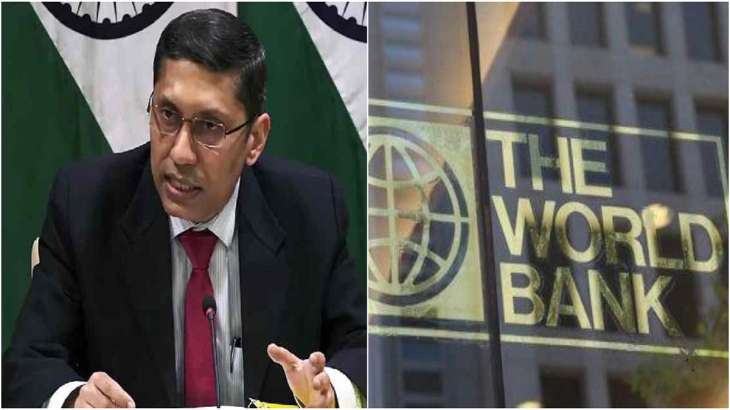
Indus Water Treaty: In the latest update on the Indus Waters Treaty (IWT) issue, India has urged the World Bank to appoint two separate procedures – a court of arbitration and a neutral expert – to settle disputes between New Delhi and Islamabad over the Kishanganga and Ratle hydropower. Questioned the decision. Projects in Jammu and Kashmir
Following Islamabad’s “obstinacy” in resolving disputes, India has also sent a notice to Pakistan seeking review and revision of the 62-year-old IWT for management of trans-border rivers.
Addressing a regular press conference on Thursday, Ministry of External Affairs spokesperson Arindam Bagchi raised concerns over the World Bank’s decision. “I don’t think they (the World Bank) are in a position to interpret the treaty for us. It is a treaty between our two countries and our assessment of the treaty is that it provides for a graded approach,” he said.
India has sent a notice to Pakistan
India took the significant step of sending a notice to Pakistan stating its intention to amend the treaty, months after the World Bank said it had appointed a neutral expert and president of the Court of Arbitration to settle the disagreement about the Kishanganga and Ratle hydropower projects. did.
According to reports, India has been particularly disappointed with the appointment of the Court of Arbitration. Responding to a question on the matter, Bagchi said at a media briefing, “The Indus Waters Commissioner of India had on January 25 issued a notice to his Pakistani counterpart to amend the Indus Waters Treaty of 1960.”
“This notice was issued with the intention of providing Pakistan an opportunity to enter into government-to-government negotiations to rectify its ongoing material violations of the treaty,” he said.
Bagchi said India called upon Pakistan to notify within 90 days a suitable date for the commencement of inter-state bilateral talks under Article 12(III) of the treaty. “I don’t know about Pakistan’s reaction yet. I am not aware of any response or comment from the World Bank.
India’s stand on the appointment of the Court of Arbitration
According to reports, India has been particularly disappointed with the appointment of the Court of Arbitration.
Responding to a question on the matter, Bagchi said at a media briefing, “The Indus Waters Commissioner of India had on January 25 issued a notice to his Pakistani counterpart to amend the Indus Waters Treaty of 1960.”
“This notice was issued with the intention of providing Pakistan an opportunity to enter into government-to-government negotiations to rectify its ongoing material violations of the treaty,” he said.
Bagchi further said that India called upon Pakistan to notify within 90 days a suitable date for starting inter-state bilateral talks under Article 12(III) of the treaty. “I don’t know about Pakistan’s reaction yet. I am not aware of any response or comment from the World Bank.
Read also: ‘Pak actions forced India’: New Delhi sends notice to Islamabad to revise 1960 Indus Water Treaty
India’s concerns
It is to be noted here that India regards the initiation of two concurrent processes to resolve the dispute as a violation of the provision of graded mechanism laid down in the treaty and wonders what would happen if the mechanism comes out with contradictory decisions.
“It was only the World Bank about five-six years ago that acknowledged the problem of having two parallel processes. Our interpretation and assessment is that it is not in consonance with the provisions of the treaty and hence we are talking about a graded approach,” Bagchi said.
(With inputs from PTI)